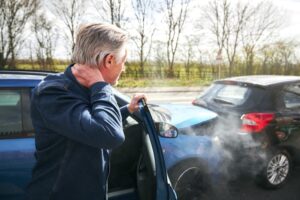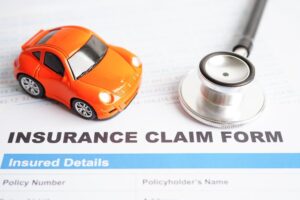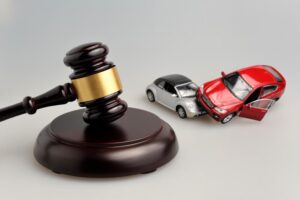Following a car crash, you can expect medical evaluations and dealing with insurance claims. You may also experience physical pain, emotional stress, and property damage.
During this time, seek ongoing medical attention, even if you feel fine, and document everything related to the accident. You should also consult an experienced car accident lawyer if you’re pursuing compensation for your injuries or damages – especially if the accident resulted from another driver’s negligence.
A skilled car accident attorney can handle every step of the process for you while you focus on attending medical appointments and getting better. Your attorney can also file a claim or lawsuit on your behalf and work to maximize the total compensation you receive – either through a favorable settlement offer from the insurance company or litigation result in the state court system.
How Do Car Crashes Most Frequently Happen?
Car accidents often occur because of the negligence of other drivers, which means they fail to act responsibly or follow traffic laws.
This happens in several ways:

- One major cause is distracted driving. Drivers who text, talk on the phone, eat, or even adjust their GPS do not pay full attention to the road. A momentary distraction can lead to accidents because the driver may not notice when traffic stops or swerves suddenly, or they may fail to see a pedestrian crossing the street.
- Another common cause is speeding. When drivers exceed the speed limit, they have less time to react to unexpected situations, like a car braking ahead of them or an animal darting into the road. Speeding also makes it harder to control the car, especially on curves or in bad weather, which can easily lead to a crash.
- Driving under the influence of alcohol or drugs is another form of negligence that causes many accidents. Impaired drivers have slower reaction times, poor judgment, and less coordination, all of which increase the risk of a serious collision. Even prescription or over-the-counter medications can affect a driver’s ability to focus and react appropriately.
- Failure to follow traffic signals and signs is also a key factor in accidents. Running red lights, failing to yield at intersections, or ignoring stop signs are reckless actions that can result in dangerous crashes, especially at high speeds.
- Tailgating, or following too closely, is another type of negligent driving. If the car ahead suddenly slows down or stops, a tailgating driver may not have enough time to brake and avoid a collision.
- Lastly, aggressive driving or road rage can lead to accidents. Drivers who weave between lanes, speed up to cut off other vehicles, or do not allow cars to merge engage in dangerous behavior that can easily lead to a crash.
In each of these cases, the driver’s failure to exercise care or obey traffic laws creates unsafe conditions that put others at risk.
Most Common Physical and Mental Injuries in Car Accidents

Car crashes can cause a wide range of injuries, both physical and mental. The severity of these injuries often depends on the speeds of the vehicles, the number of vehicles, and the type of collision involved.
Some of the most common physical injuries include whiplash, broken bones, head injuries, and cuts or bruises.
- Whiplash is one of the most common injuries in rear-end car collisions. It happens when the neck is jolted back and forth, causing pain and stiffness. Treatment for whiplash typically includes rest, physical therapy, and sometimes pain medication.
- Broken bones are also common, especially in high-speed crashes. These can range from simple fractures to more complex breaks that may require surgery. The healing process may involve wearing a cast or brace, and physical therapy is often necessary to restore strength and mobility.
- Head injuries, including concussions, can occur when a person’s head hits the steering wheel, dashboard, or window. Concussions can lead to headaches, dizziness, and even memory loss. In more severe cases, traumatic brain injuries (TBIs) can occur, which may require long-term rehabilitation and care.
- Cuts and bruises often happen when the body hits broken glass or hard surfaces. Deep cuts may require stitches, and large bruises may need medical attention to ensure no underlying injuries like muscle damage.
- In addition to physical injuries, car crashes can lead to significant mental and emotional trauma. Post-traumatic stress disorder (PTSD) is one of the most common mental health issues after a serious accident. People with PTSD may have flashbacks, anxiety, or trouble sleeping. Therapy, counseling, and sometimes medication can help manage these symptoms.
- Depression and anxiety are also common after car accidents, especially if the victim is dealing with severe physical injuries or a long recovery process. Support from family, friends, and mental health professionals is important to overcoming these challenges.
What Happens After a Car Crash?
After leaving the scene of a car crash and receiving initial medical treatment, to ensure proper recovery, legal protection, and potential compensation:
- First, follow up with your healthcare provider. Even if you received initial medical attention at the scene or in the emergency room, you may need ongoing treatment. Some injuries, like whiplash or concussions, may not fully appear until days after the accident. Keeping track of your symptoms and attending follow-up appointments ensures that doctors properly diagnose and treat all injuries. This also creates a medical record, which you need to file a personal injury claim or lawsuit.
- In the days following the accident, gather and keep all documentation related to the crash. This includes the police report, medical records, receipts for medical bills, and any estimates for vehicle repairs. Having organized records will help to streamline the claims process and ensure you have all of the necessary documentation if the case goes to court or mediation.
- At this stage, it’s also a good idea to consult with an experienced personal injury attorney – especially if the car accident resulted in injuries or anyone disputes fault. An attorney can protect your rights throughout the entire process, negotiate with insurance companies, and seek compensation for medical expenses, lost earnings, and pain and suffering. They can also navigate complex legal processes and file all paperwork correctly and on time. Specifically, they can:
- File a timely claim, usually with the at-fault driver’s insurance company, for compensation for your various losses
- Negotiate with insurance company adjusters for the fair compensation you deserve
- File a lawsuit and litigate your case through the court system, especially if the insurance company disputes fault for your accident or refuses to offer you sufficient monetary damages to adequately compensate you for your injuries and other losses
As you move forward, follow your doctor’s advice and complete any necessary treatments, such as physical therapy or rehabilitation. Insurance companies may try to reduce their payout if you don’t follow through on prescribed treatments, arguing that you didn’t take proper care of your injuries.
Finally, you must monitor your physical and emotional recovery. Emotional injuries like anxiety or PTSD may develop later. If you notice any mental health concerns, seek help from a therapist or counselor to address them early on.
What Do You Need to Prove to Recover Full Compensation in Your Car Accident Claim or Lawsuit?

To recover financial compensation in a car accident case, you must prove several key elements demonstrating the other party’s responsibility for your injuries and losses.
These vital elements in any personal injury claim or lawsuit are often called the elements of negligence.
- First, you must establish a duty of care. This means showing that the other driver had a legal responsibility to drive safely. All drivers must follow traffic laws, maintain control of their vehicles, and avoid harming others. For example, obeying speed limits, stopping at red lights, and not driving while distracted are all part of this duty.
- The second element you need to prove is breach of duty. This occurs when the other driver fails to meet their duty of care. If they broke the speed limit, drove under the influence, ran a stop sign, or texted while driving, they breached their duty. You must show evidence that the driver acted carelessly or recklessly, which led to the accident.
- The third element is causation. Here, you must demonstrate that the other driver’s breach of duty directly caused the accident and your injuries. This means showing that, had the driver not been negligent, the crash would not have occurred, and you would not have suffered harm. For example, if a driver ran a red light and hit your car, you need a lawyer to clearly show that this violation led to the collision and caused your injuries.
- Finally, you must prove damages. Damages refer to the financial, physical, and emotional losses you suffered due to the accident. This can include medical bills, lost income, pain and suffering, vehicle repair costs, and other expenses related to the crash. Medical records, pay stubs, repair estimates, and testimony from doctors or other professionals can help to establish the full extent of your damages.
To recover financial compensation, all four elements – duty of care, breach of duty, causation, and damages – must be proven with evidence. This evidence can include police reports, eyewitness testimony, photos or videos from the accident scene, and expert opinions.
In many instances, an experienced car accident attorney can significantly improve your chances of proving these elements and obtaining the compensation you deserve for your accident-related losses.
Common Recoverable Losses in Car Accident Cases

In a car accident case, victims may receive compensation to cover their losses.
The three most common losses are economic damages, non-economic damages, and punitive damages.
- Economic damages cover measurable financial losses that occur because of the car crash. These may include medical expenses like hospital bills, surgeries, and physical therapy. If you miss work due to your injuries, you can also recover compensation for lost income. Property damage, like repairing or replacing your car, is another example of economic damage. Receipts, bills, or pay stubs can support these typically straightforward costs.
- Non-economic damages are more difficult to calculate because they compensate victims for the pain and suffering resulting from the accident rather than specific monetary losses. These damages can cover emotional distress, physical pain, and the loss of enjoyment of life. For instance, if your injuries prevent you from participating in hobbies or spending quality time with loved ones, non-economic damages can compensate for those losses. While these damages don’t have a clear dollar amount, attorneys often use various methods, like multipliers, to estimate their value.
- Punitive damages punish the at-fault party rather than compensate the car accident victim directly. Courts may award punitive damages in cases where the other driver acted with extreme negligence or reckless behavior, such as driving under the influence or engaging in road rage. Punitive damages discourage similar actions, not just by the person who caused the accident but also by others.
An experienced car accident lawyer will work hard to highlight the strengths of your case (including favorable evidence) – while downplaying any weaknesses – to maximize the total compensation award you receive for your accident-related losses.
Speak With a Knowledgeable Car Crash Attorney About Your Case Today
If you suffered injuries in a recent car accident, a knowledgeable personal injury lawyer will let you know what to expect.
Your attorney can handle every step of the claims-filing process for you, from investigating your accident circumstances to negotiating with insurance company representatives.
They can also take your case to court if the insurance company refuses to compensate you fairly and work to maximize your damages.
 Truck Accident
Truck Accident
 Motorcycle Accidents
Motorcycle Accidents
 Wrongful Death
Wrongful Death
 Car Accident
Car Accident







